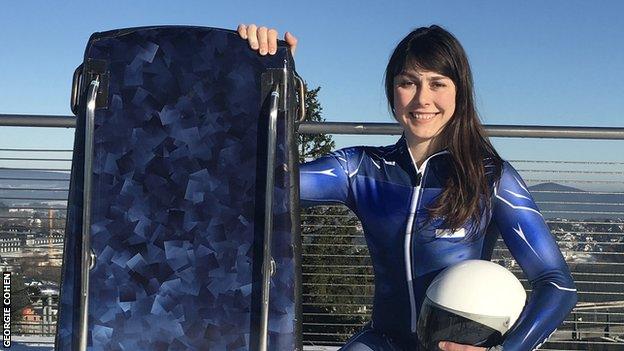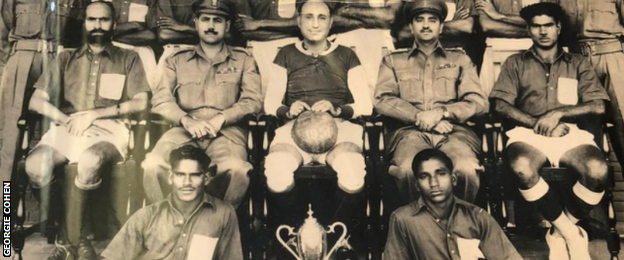Winter Olympics: Skeleton racer Georgie Cohen chasing dream with Israel
- Published

Georgie Cohen was able to compete globally over the winter despite coronavirus restrictions
"To be able to represent Israel, and as a Jewish person to be free to do that with no setbacks, is something that's a very personal legacy to be chasing."
Georgie Cohen is from Cambridge and had barely heard of the sport of skeleton until her dad took up bobsleigh at the age of 50.
Over a period of years a hobby became a passion and, after gaining Israeli citizenship, in 2019 she became the first woman to compete for the country at the World Championships.
Motivated by her late grandfather, who missed out on becoming an Olympian because of his religion, the 32-year-old is determined to qualify for next year's Winter Olympics in Beijing.
'They said it was too dangerous for him to go'
Maurice Cohen was part of a Jewish family originating from Iraq and then moved to India, known at the time as British India.
He excelled in cricket and hockey but was also part of the country's water polo team that earned a place at the 1936 summer Olympic Games in Berlin.
However, at the time Germany was under the rule of the Nazis, who barred Jewish athletes from representing the country - that in turn made things difficult for Jews from elsewhere.
"The team turned around to him and said it was too dangerous for him to go," Georgie told BBC Sport.
"He did contest the decision but they said 'no, your safety comes first', so he had to sit back and watch his team-mates compete."

Georgie's grandfather Maurice (centre) poses with team-mates
Maurice moved to London in 1961, though much of his granddaughter's family live in Israel - which played a large part in Cohen getting citizenship.
"It was one of those serendipity moments I think - I was looking for big change in my life, I was doing skeleton for fun and I was exploring maybe going out to Israel anyway," she said.
"As a Jewish person you can make aliyah, which means to emigrate to Israel, and it was one of those things that, with the sport, just set off and sparked this amazing adventure for me."
Cohen is trying to follow in the footsteps of AJ Edelman, an American-born skeleton racer who became Israel's first Olympian in the sport in 2018, a story which "inspired and resonated" with her.
'Mum, I'm going to quit my job'
Cohen was 24 when she first got on a sled as part of a week-long Royal Navy camp in Austria, and skeleton became a pastime.
"It was a week a year, in my holiday, going and training and being invited back by the awesome navy, Royal Air Force and army teams, going to train with them," she said.
She joined the Israel team in 2018 and competed at the World Championships in Canada the following year while still holding down a full-time job, finishing last out of the 26 competitors, before reaching a crossroads.
"It became really obvious last year that if I wanted to get the progress and results that I need to qualify for the Olympics, which is my goal, then I needed to be able to dedicate completely full-time to this," she said.
"In September I called it quits and said 'right, this is it' and it was my first season when I was able to fully dedicate to skeleton."
Cohen is having to raise money through crowdfunding, sponsors and family to be able to compete at the highest level, with just one skeleton run costing 40 euros (£34.05) and a sled coming in at £10,000 - but they are just the basics.
"I did my budgets - and don't gasp too much - but if you want to do this properly and you include all your coaching, the nutrition, psychology and all the things you need, it comes to approximately £85,000, which is quite a big sum.
"My family are probably the biggest sponsors of anybody - especially when at 31 your daughter turns around and says 'hey mum, I'm going to quit my job'."
The road to Beijing

There are no skeleton tracks in either the United Kingdom or Israel, so travel is necessary in order to practise
Qualification for February's Olympics starts in October, with eight races counting towards a final ranking which will see the top 25 make it to the start line.
"It's definitely not going to be a walk in the park, it's not going to be easy at all, but it's a challenge that I'm really ready to stand up and face," added Cohen.
"The opportunity is there - I've been working really hard to set my team up around me, so that we're going to tackle this in the best strategic way.
"It is absolutely possible and usually if I set my mind to something then I'll keep following it through.
"I love the sport so I'm planning nothing other than Olympic qualification."
While competing at an Olympics is the pinnacle of any athlete's career, there is certainly an extra dimension to Cohen's story - the English-born woman who took to skeleton late, has already made history for Israel and is fighting to get the Cohen name to a Games 86 years after her grandfather was cruelly denied.
"If I was able to make it to the Olympics there would be a huge sense of pride for me representing Israel and my family, it would be a great sense of accomplishment," she said.
"It's been a personal cultural experience as well that's really fulfilling - it's felt like a whirlwind and taken me to the most amazing places and the most amazing life experiences."

Being: How are different faiths celebrated in modern Britain?
Easter around the globe: Test your knowledge of how different countries celebrate the holiday
